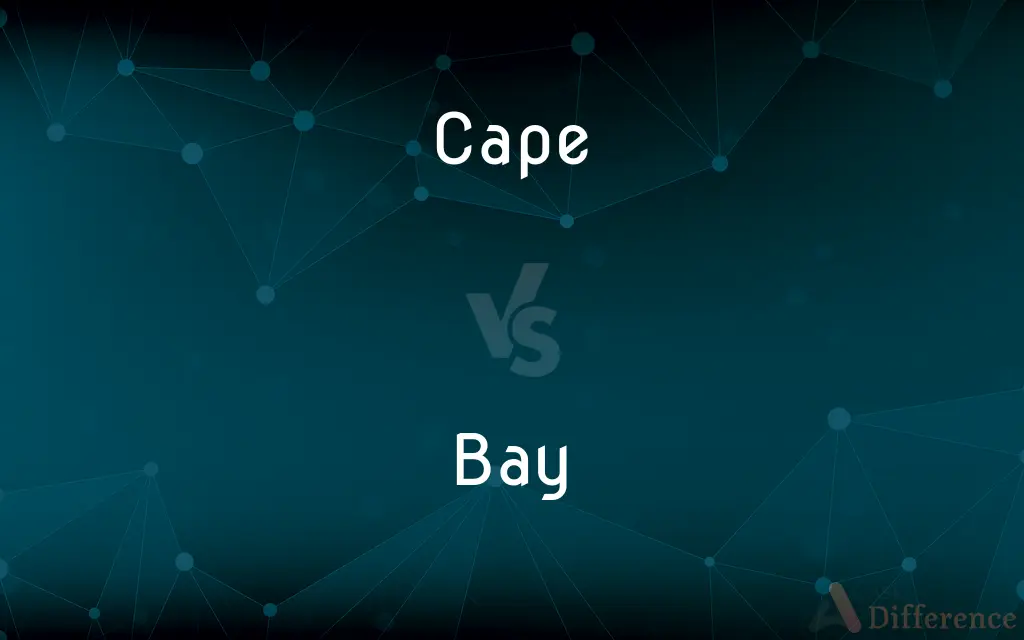Cape vs. Bay — What's the Difference?
By Tayyaba Rehman — Updated on November 3, 2023
A cape is a pointed piece of land jutting into a body of water, while a bay is a body of water partially enclosed by land with a wide mouth.

Difference Between Cape and Bay
Table of Contents
ADVERTISEMENT
Key Differences
A cape is a high point of land that extends into a river, lake, or ocean. The landform is usually narrow, and it is formed by various geological processes, including the action of waves. A cape is generally marked by a significant change in trend on the coastline. In contrast, a bay is a body of water that is partially enclosed by land but has a wide outlet to the sea. Bays can form through various processes, such as the flooding of a river valley or glacial action, creating a concave shape.
Capes are typically characterized by their distinctive rugged coastlines and are often significant navigational landmarks. They are frequently found at the junction of two bodies of water. Unlike capes, bays are known for their calmer waters due to being sheltered from direct wave action by the land surrounding them. This makes bays excellent places for ports and harbors, offering safe anchorage for ships.
The formation of a cape is often the result of differential erosion, where harder rock outlasts softer rocks to create a protruding headland. Capes can also be formed by the buildup of sand and other sediment from longshore drift. Bays, on the other hand, are usually the product of a recess in the coastline, often due to the sinking of land, retreat of glaciers, or rising sea levels. The formation of bays can also provide fertile areas for marine life due to the protection from harsh sea conditions.
Geologically, capes and bays can have an effect on local climates. Capes may be subject to more extreme weather conditions, bearing the brunt of sea winds and storms, while bays tend to have milder weather due to their protected waters. In addition, bays often contribute to the moderation of coastal climates by storing heat in the summer and releasing it during colder months.
While capes and bays are both coastal features, they present different opportunities and challenges for human activity. Capes are often less developed due to their harsh terrain and exposure to the elements, making them popular for lighthouses, lookout points, and in some cases, for military purposes. Conversely, bays have historically been hubs of commerce, settlement, and recreation, offering a natural protection for maritime activities.
ADVERTISEMENT
Comparison Chart
Definition
Pointed land extending into water
Water body partially enclosed by land
Formation
By erosion or sediment accumulation
Often by land sinking or sea level rise
Waters
Open and possibly rough
Sheltered and calm
Coastline
Generally narrow and rugged
Typically wide and recessed
Uses
Navigational landmarks, undeveloped
Harbors, ports, settlements
Compare with Definitions
Cape
A pointed piece of land jutting into a sea or lake.
Sailors navigated around the rocky cape with caution.
Bay
A body of water enclosed by a wide curve of the shoreline.
The calm waters of the bay were perfect for swimming.
Cape
An elevated landform extending into a body of water.
The cape rose majestically above the ocean waves.
Bay
An inlet of the sea or other body of water usually smaller than a gulf.
They dropped anchor in a secluded bay for the night.
Cape
A landmass that marks a significant change in the direction of the coastline.
The ship turned at the cape to enter the strait.
Bay
An area of water bordered by land on three sides but with a wide mouth.
The bay teemed with marine life, attracting divers from around the world.
Cape
A cape is a sleeveless outer garment which drapes the wearer's back, arms, and chest, and connects at the neck.
Bay
A bay is a recessed, coastal body of water that directly connects to a larger main body of water, such as an ocean, a lake, or even another bay. A large bay is usually called a gulf, sea, sound, or bight.
Cape
A sleeveless cloak, typically a short one
He was wearing a flowing cape
Bay
A body of water partially enclosed by land but with a wide mouth, affording access to the sea
The Bay of Biscay.
Cape
The pelt from the head and neck of an animal, for preparation as a hunting trophy
The hair on a cape for the taxidermist can spoil in warm weather
Bay
An area of land, such as an arm of prairie partially enclosed by woodland, that resembles in shape or formation a partially enclosed body of water.
Cape
A headland or promontory
We could see the island from the cape
Bay
(Architecture) A part of a building marked off by vertical elements, such as columns or pilasters
An arcade divided into ten bays.
Cape
(in bullfighting) taunt (the bull) by flourishing a cape
The film shows a man expertly caping a charging bull
Bay
A bay window.
Cape
Skin the head and neck of (an animal) to prepare a hunting trophy.
Bay
An opening or recess in a wall.
Cape
A sleeveless outer garment fastened at the throat and worn hanging over the shoulders.
Bay
A section or compartment, as in a service station, barn, or aircraft, that is set off for a specific purpose
A cargo bay.
An engine bay.
Cape
A brightly colored cloth used in maneuvering the bull in a bullfight; a capote or muleta.
Bay
A sickbay.
Cape
A point or head of land projecting into a body of water.
Bay
(Computers) A drive bay.
Cape
To maneuver (the bull) by means of a cape in a bullfight.
Bay
A reddish brown.
Cape
(geography) A piece or point of land, extending beyond the adjacent coast into a sea or lake; a promontory; a headland.
Bay
A reddish-brown animal, especially a horse having a black mane and tail.
Cape
A sleeveless garment or part of a garment, hanging from the neck over the back, arms, and shoulders.
Bay
A deep, prolonged bark, such as the sound made by hounds.
Cape
(slang) A superhero.
Bay
The position of one cornered by pursuers and forced to turn and fight at close quarters
The hunters brought their quarry to bay.
Cape
To incite or attract (a bull) to charge a certain direction, by waving a cape.
Bay
The position of having been checked or held at a distance
"He has seen the nuclear threat held at bay for 40 years" (Earl W. Foell).
Cape
(nautical) To head or point; to keep a course.
The ship capes southwest by south.
Bay
See laurel.
Cape
To skin an animal, particularly a deer.
Bay
Any of certain other trees or shrubs with aromatic foliage, such as the California laurel.
Cape
To defend or praise, especially that which is unworthy.
Bay
A crown or wreath made especially of the leaves and branches of the laurel and given as a sign of honor or victory.
Cape
(obsolete) To look for, search after.
Bay
Often bays Honor; renown.
Cape
To gaze or stare.
The captain just caped mindlessly into the distance as his ship was hit by volley after volley.
Bay
Reddish-brown
A bay colt.
Cape
A piece or point of land, extending beyond the adjacent coast into the sea or a lake; a promontory; a headland.
Bay
To utter a deep, prolonged bark.
Cape
A sleeveless garment or part of a garment, hanging from the neck over the back, arms, and shoulders, but not reaching below the hips. See Cloak.
Bay
To pursue or challenge with barking
"I had rather be a dog, and bay the moon" (Shakespeare).
Cape
To head or point; to keep a course; as, the ship capes southwest by south.
Bay
To express by barking or howling
A mob baying its fury.
Cape
To gape.
Bay
To bring to bay
"too big for the dogs which tried to bay it" (William Faulkner).
Cape
A strip of land projecting into a body of water
Bay
(obsolete) A berry.
Cape
A sleeveless garment like a cloak but shorter
Bay
, a tree or shrub of the family Lauraceae, having dark green leaves and berries.
Cape
A promontory of large size extending into a body of water.
They enjoyed a stunning view of the coastline from the edge of the cape.
Bay
Bay leaf, the leaf of this or certain other species of tree or shrub, used as a herb.
Cape
A high point of land that defiantly extends into a body of water.
The lighthouse stood on the cape, guiding ships to safety.
Bay
The leaves of this shrub, woven into a garland used to reward a champion or victor; hence, fame, victory.
Bay
A tract covered with bay trees.
Bay
A kind of mahogany obtained from Campeche in Mexico.
Bay
(geography) A body of water (especially the sea) more-or-less three-quarters surrounded by land.
Bay
A bank or dam to keep back water.
Bay
An opening in a wall, especially between two columns.
Bay
An internal recess; a compartment or area surrounded on three sides.
Bay
The distance between two supports in a vault or building with a pitched roof.
Bay
(nautical) Each of the spaces, port and starboard, between decks, forward of the bitts, in sailing warships.
Bay
(rail transport) A bay platform.
Bay
A bay window.
Bay
The excited howling of dogs when hunting or being attacked.
Bay
(by extension) The climactic confrontation between hunting-dogs and their prey.
Bay
(figuratively) A state of being obliged to face an antagonist or a difficulty, when escape has become impossible.
Bay
A brown colour/color of the coat of some horses.
Bay
A horse of this color.
Bay
(intransitive) To howl.
Bay
(transitive) To bark at; hence, to follow with barking; to bring or drive to bay.
To bay the bear
Bay
(transitive) To pursue noisily, like a pack of hounds.
Bay
Of a reddish-brown colour (especially of horses).
Bay
Reddish brown; of the color of a chestnut; - applied to the color of horses.
Bay
An inlet of the sea, usually smaller than a gulf, but of the same general character.
Bay
A small body of water set off from the main body; as a compartment containing water for a wheel; the portion of a canal just outside of the gates of a lock, etc.
Bay
A recess or indentation shaped like a bay.
Bay
A principal compartment of the walls, roof, or other part of a building, or of the whole building, as marked off by the buttresses, vaulting, mullions of a window, etc.; one of the main divisions of any structure, as the part of a bridge between two piers.
Bay
A compartment in a barn, for depositing hay, or grain in the stalks.
Bay
A kind of mahogany obtained from Campeachy Bay.
Bay
A berry, particularly of the laurel.
Bay
The laurel tree (Laurus nobilis). Hence, in the plural, an honorary garland or crown bestowed as a prize for victory or excellence, anciently made or consisting of branches of the laurel.
The patriot's honors and the poet's bays.
Bay
A tract covered with bay trees.
Bay
Deep-toned, prolonged barking.
Bay
A state of being obliged to face an antagonist or a difficulty, when escape has become impossible.
Embolden'd by despair, he stood at bay.
The most terrible evils are just kept at bay by incessant efforts.
Bay
A bank or dam to keep back water.
Bay
To bark, as a dog with a deep voice does, at his game.
The hounds at nearer distance hoarsely bayed.
Bay
To bark at; hence, to follow with barking; to bring or drive to bay; as, to bay the bear.
Bay
To bathe.
Bay
To dam, as water; - with up or back.
Bay
An indentation of a shoreline larger than a cove but smaller than a gulf
Bay
The sound of a hound on the scent
Bay
Small Mediterranean evergreen tree with small blackish berries and glossy aromatic leaves used for flavoring in cooking; also used by ancient Greeks to crown victors
Bay
A compartment on a ship between decks; often used as a hospital;
They put him in the sick bay
Bay
A compartment in an aircraft used for some specific purpose;
He opened the bomb bay
Bay
A small recess opening off a larger room
Bay
A horse of a moderate reddish-brown color
Bay
Utter in deep prolonged tones
Bay
Bark with prolonged noises, of dogs
Bay
(used of animals especially a horse) of a moderate reddish-brown color
Bay
A broad inlet where the land curves inward.
The city's skyline was visible across the bay.
Bay
A recessed coastal body of water that directly connects to a larger main body.
Fishermen set out to catch the morning's bounty in the bay.
Common Curiosities
What defines a cape?
A cape is a pronounced point of land that sticks out into a body of water.
Can a cape be found on a lake?
Yes, capes can be found on lakes as well as seas and oceans.
Is a bay always larger than a cape?
Not necessarily; size isn't what differentiates a bay from a cape, but rather their formation and features.
Can a cape form at the edge of a bay?
Yes, it's possible for a cape to form at the edge of a bay.
Is a bay a type of coastline?
Yes, a bay is a feature of a coastline, where the land curves inward by the sea.
Do bays have beaches?
Many bays have beaches, especially in the more recessed areas where sediment can accumulate.
Are all bays safe for swimming?
Many bays are safe due to calm waters, but safety also depends on other factors like marine life and currents.
Do capes always have lighthouses?
Not always, but lighthouses are commonly built on capes due to their prominence.
Are bays good locations for ports?
Yes, bays are often used as ports because of their sheltered waters.
Do bays affect local weather?
Yes, bays can moderate local climate by trapping heat and reducing wind speed.
What activities are capes known for?
Capes are known for sightseeing, lighthouses, and sometimes for their strategic military location.
Can a bay be formed by a river?
Yes, a bay can be formed by the broad mouth of a river as it meets another body of water.
What is the difference between a cape and a peninsula?
A cape is generally narrower and more pointed than a peninsula, which is a larger body of land extending into water.
Are bays formed by tectonic activity?
Some bays can be formed by tectonic activity, like the sinking of the land, but not all.
Are capes always rocky?
Many capes are rocky due to erosion, but not all capes have to be rocky.
Share Your Discovery

Previous Comparison
County vs. Parish
Next Comparison
Deaf vs. MuteAuthor Spotlight
Written by
Tayyaba RehmanTayyaba Rehman is a distinguished writer, currently serving as a primary contributor to askdifference.com. As a researcher in semantics and etymology, Tayyaba's passion for the complexity of languages and their distinctions has found a perfect home on the platform. Tayyaba delves into the intricacies of language, distinguishing between commonly confused words and phrases, thereby providing clarity for readers worldwide.
















































